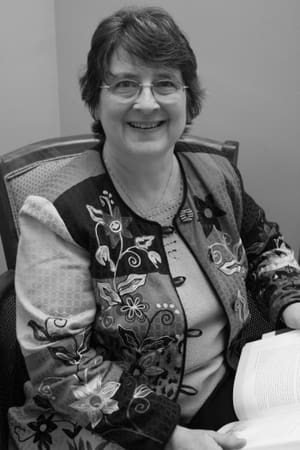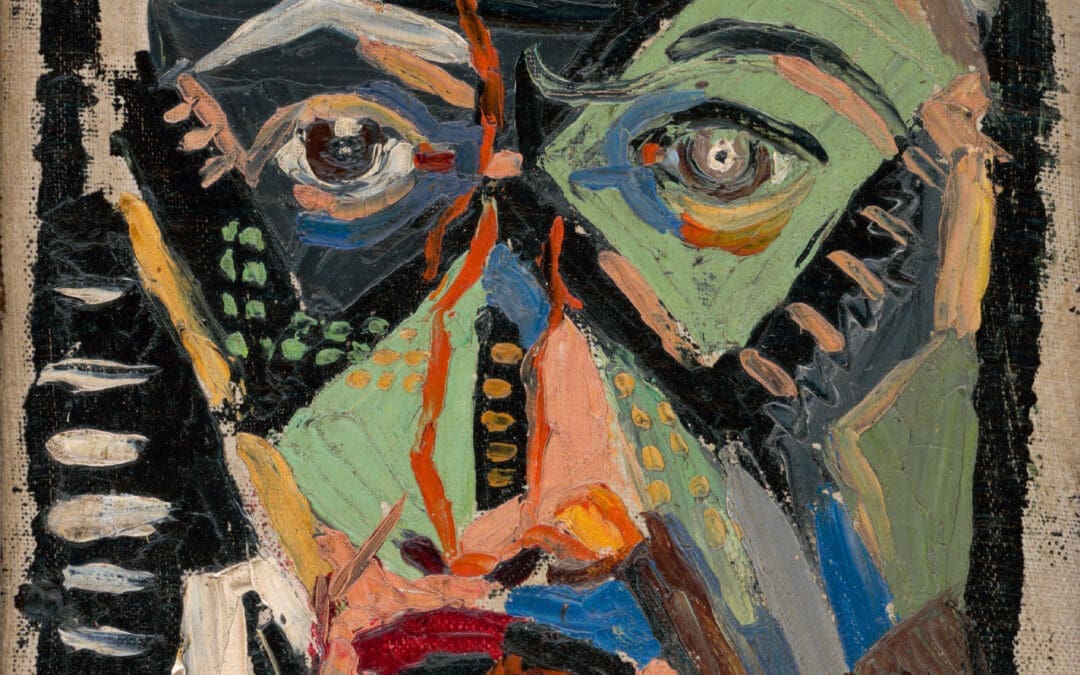Inspired by the interviews in the Paris Review and Bomb magazine, “The Questions” in Sports Illustrated, and the regular interviews on the blogs of Tom Peters and Guy Kawasaki, Comment has asked a diverse group of mentors for their stories.
Comment: How would you explain what you do to an interested nine-year-old child?
Barbara Hampton: I help students at the College of Wooster make their papers better. I also teach classes that help students think and write more carefully.
Comment: What first drew you to this work?
BH: When I began in 1986, all my children were in school all day and I wanted to use my skills, which are (by training) in writing and teaching, but only part-time because I wanted to be home with my kids after school. My job as a consultant in the College’s Writing Center perfectly fit those criteria. Not everyone is so lucky to find that, especially since the pay is not enough to support a family. A single person or a one-income family could not live on my salary; it supplements my husband’s (this is a dying model). The fact that the job was at the College, which is the center of our professional and social and even religious existence, was all the better. My husband, who teaches mathematics at the College of Wooster, and I have been the faculty advisors to our InterVarsity Christian Fellowship chapter since 1972. With my job, I could minister to student there from within, not as an outsider. For many years, I have sat on the InterFaith Council and have had the privilege of working on the committee that designed and implemented the new “Wooster Ethic,” a re-established “honour code” of academic and social responsibility.
Comment: As a novice, what were your most valuable learning experiences?
BH: Within a couple of years of my joining the staff, the Director of the Writing Center offered its para-professional staff some theoretical training in writing theory. However, the most valuable learning I had was on-the-job training, faced with a student who had written an unclear paper and working through it. Today, I can say to that student, “Hey, there are some tricks to the craft of writing. Sure, it takes a lot of work, but it is not a mystery. Here’s, for example, how you make this sentence clear—you ask yourself, ‘Who does what to whom?’ and then based on that answer you make the ‘who’ the subject, ‘what’ the verb and ‘to whom’ (or how or why?) the object (or ending, or whatever that sentence dictates).” Probably the most useful text in this regard is Joseph William’s Style: Ten Lessons in Clarity and Grace. I have honed his lessons, applied them in my own work with students and as a would-be writer, and taught them in many classes on campus as one-time workshops.
Comment: What is the best advice you’ve ever been given?
BH: “Don’t hold the pen,” because we want to empower student writers, not “fix papers.” However, I struggle with this rule to this day, out of early bad habits (when no one said this to us) and out of the sheer need for efficiency, getting one student out of the office so the next one can come in. Even though this 21st year is my last year doing this work, I remind myself not to hold the pen every day. (I have gotten much better the last couple of years.) I’ll add another very important piece of advice, which is true for just about any aspect of life and ministry, and that is to “listen.” We do our work by asking questions and listening to the answers for a guide as to how to proceed.
Comment: From what sources do you draw inspiration for your work?
BH: The students who improve. I have received many sweet thank you notes over the years.
Or then there are the students who probably don’t really need us but who come to us so they can move towards perfection. When one of my dear colleagues retired a couple of years ago, she was so thrilled that the last student she worked with was a gal who at graduation would receive honors on her double-major independent study (each student at Wooster must complete a year-long independent study on a topic about which they are passionate). Having had no class in filmmaking or editing, Katie had created a documentary about impoverished black children in a medium-sized Michigan community, trying to discern through their own words how they perceived their lives and aspirations. She then wrote an 80-page sociological analysis of her findings and a 60-page text that set her documentary into the context of the history and theory of film, trying to determine if film could ‘tell the truth.’ You can see why Linda loved to work with Katie! I did too, and added to that was the fact that I was mentoring her and some of her African-American friends in their Bible study and Christian witness on campus. (Two years later, Katie received a full-scholarship to graduate school in film studies at the University of Texas). It’s the students who keep us going.
Comment: What rituals and habits structure your workday?
BH: I check email and my blogroll first! Then I check my schedule—this is all on-line now, a new innovation—and make sure that all my reference works and pens and a pad of paper are at the ready. I do love to chat with my colleagues a bit if time allows. We work to the rhythms of the semester, which means “Help!” when the first set of papers or early mid-term papers come due.
Comment: What are your favorite tools?
BH: Each year I buy a set of Pilot fine point pens in five colors. I never write on a paper (oops, I’m not supposed to do that anyhow, but I did grade papers too when I taught First Year Seminar) in red. Never. For too many students, red mean “blood is being spilled!” I know it is just symbolic, but there’s purple and green and blue and turquoise. Why limit yourself to red? Students can chose their favorite colored pen from the mug on the desk they use in our sessions. (My daughter made that mug in an art class when she was a child. I love how it constantly reminds me of her). I keep the variety of style guides on my desk, Diana Hacker’s A Writer’s Reference (in my experience, the best compact writer’s handbook), a dictionary and a thesaurus. My boss says that they’ll put my dictionary and thesaurus into a glass case when I retire as “artifacts.” I use them every day (though few of my colleagues seem to).
Comment: Tell us about a project that delighted you.
BH: Our Writing Center jobs until very recently have been 9-4 jobs that are not project focused. For thirteen of my years I have also taught in the college’s first year seminar on critical inquiry. (All first year students must take this seminar; the professors’ interests determine the various topics, but all must contain writing instruction). For several of those years, I arranged service-learning projects in the community for my students related to our topics of tolerance/truth, conscience/human rights, and prisons/freedom. I believe (and some research has shown this) that students learn more deeply if they put the abstract concepts into practice and reflect on those practices in light of the concepts.
Another project is perhaps only tangential to my work in the Writing Center, but it grew out of sharing students’ lives on campus. After 9/11 I developed a Bible/Qur’an inductive study guide and worked through it with Muslim and Christian student friends. I feel as though this project brought together many threads of my life and training in a way I could never have anticipated when I was younger. It has not been published, but I continue (as time allows me) to revise it (into a book, not a study guide) with a sometimes faltering hope that it will be useful to Christians who long for the salvation of their Muslim friends. As we retire next spring and move to Michigan (where one of our daughters lives in a Christian group home), I will be very deliberate in my efforts to find volunteer ministry opportunities to interact redemptively with Muslims.
Comment: How do you plan your work?
BH: I love the big-picture planning stuff. When I teach adult Sunday School, put together a first year seminar class, or, now this last year, conduct writing workshop for other first year seminar classes, the conceptualization phase is the most fun for me. It’s hard to say how things come together, but reading, reading, reading is certainly central, and it works inductively from there. I draw charts and outlines, make some sort of visual representation of the ideas as they form. I over-prepare, I know—my husband would say this is a fault of mine.
Comment: How does your work connect to other aspects of your life?
BH: I think many of my previous answers have prefigured my answer to this question. They are very connected in a way that many people are not privileged to experience. The students on this campus (first of all) to whom God has called us are central to everything we do. Unlike some of our few Christian colleagues on this secular liberal arts college (and we are not criticizing them for their decisions in this regard), we have always seen the campus as our place of ministry, even more than the church (although we are active there). My job allows me to connect to them as a professor, as a tutor, as a mentor, as an advisor, as a prayer-partner. I only have to travel one mile and here they are! In this regard, we can only say that our lives have a rich texture of interwoven pieces, work, leisure, family (our other two daughters are in academia, as a physics professor and an e-learning librarian), ministry, all of which would unravel if one piece were removed—as will happen next year when we retire, we realize.
Nevertheless, I have struggled for most of my career with feeling like a second-class citizen. I do not have the PhD that allows people membership in the academic club, despite the fact that I am a lifelong learner. However, I cannot complain and I try to decrease my discouragement and grumbling. Just answering these Comment questions reminds me again of how much God has blessed me by allowing me to work at the College of Wooster.

